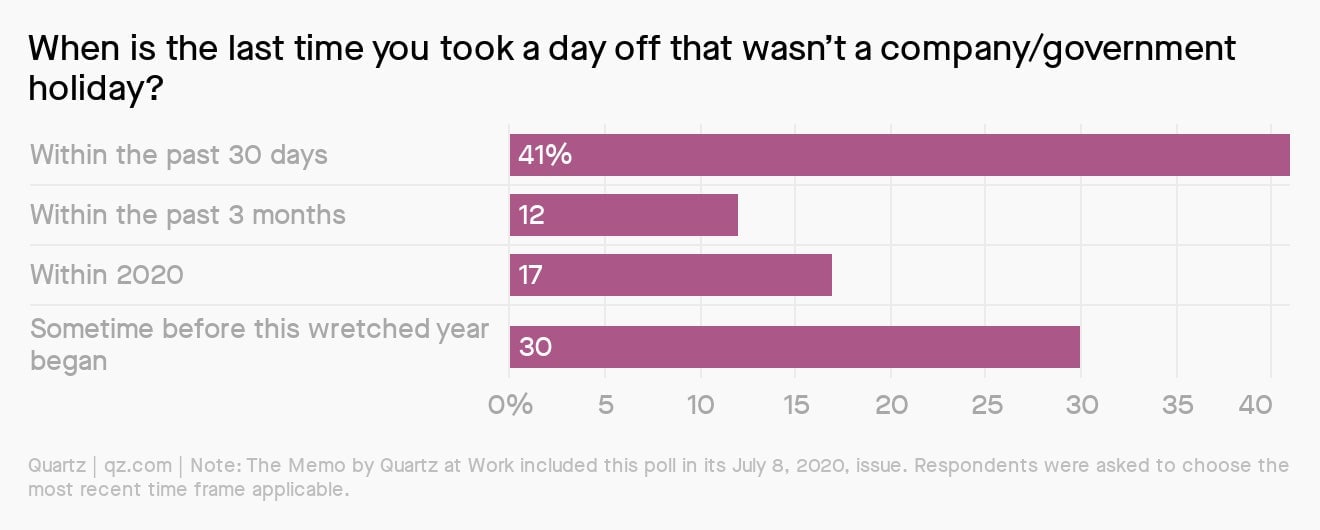The Memo: Reckoning with race at work, in the open
To modern workers everywhere,

To modern workers everywhere,
A lot of companies are scared to talk about race.
I learned that the hard way when I set out to report stories for this week’s Quartz membership field guide on what an anti-racist company looks like. I cast a wide net, hoping to talk to lots of different types of organizations about what they were doing to combat bias and systemic injustice. I reached out to an orchestra, a financial institution, a beverage company, a glossy magazine.
I got an abundance of no’s. Well, to be more accurate: Some companies said yes, then dropped out the day we were set to have the interview. Some sat on the invitation for weeks. Others ghosted me.
On a personal level, this was annoying but ultimately fine, since some fascinating organizations—including a nonprofit for artists, an insurance behemoth, a temporary staffing agency, and a restaurant that employs previously incarcerated people—did agree to talk about the strategies they’re trying out to bring more equality to the workplace. (You can read all about them here.)
As a reflection of how companies are doing when it comes to reckoning with racial justice, however, this experience worried me. It seems a lot of companies are too afraid of being called out for their shortcomings by their own employees and consumers to talk openly about what they’re trying to change. They’re still on the defensive. And that’s an attitude that allows racism to remain embedded, even in companies that consider themselves progressive.
One of the most common questions I received from companies I asked to participate was: “Who else is doing it?” It felt like trying to throw a high-school party where none of the guests would RSVP unless they were confident that attending would up their social status. One communications rep balked when I mentioned some of the other companies I was interviewing, saying she was worried her employer might look bad by comparison.
But the anti-racist movement isn’t about making any company or person look good or bad. Everyone has more work to do. And part of that work involves committing to public accountability and transparency, which research shows are essential to making real progress on diversity.
Of course, it’s normal for companies to worry about upholding their image. Yet one big lesson of the publicity fiascos of recent weeks is that the truth will come out, whether companies want it to or not.
It’s in everyone’s best interest for companies to start talking about how they might uproot the structures that perpetuate racism—if not with the press, then at least with employees, investors, and customers. It’s risky, sure. But it’s even riskier to stay silent. And somebody has to go first.—Sarah Todd
+ Quartz members get full access to our field guide on how to build an anti-racist company. Not a member yet? Get 40% off the first-year Quartz membership price of $99 by using the code QZFLASHSALE.
Sign up here for Quartz membership or for a free, seven-day trial.
How Covid-19 is affecting employment for older workers.
Tips for retooling remote work for the long haul.
Education is a vicious knock-out question for candidates of hourly jobs.
Creativity is vital to your company’s recovery—and good leaders can foster it.
30-second case study
Like a lot of startups, Mailchimp, the email marketing platform, was born obsessed with the user experience and light on hard numbers. Qualitative measures ruled the day. But eventually the company adopted key performance indicators (KPIs), as adulting startups often do. It didn’t yield much.
“The movement in team KPIs seemed to track with the macro-level growth of the company. The teams couldn’t articulate how their actions affected the KPIs they’d chosen,” Mailchimp chief product officer John Foreman writes this week in Quartz at Work. Plus, “[w]hen we looked at the work the teams had chosen to prioritize … it wasn’t necessarily the most valuable work given their selected KPI.”
An experiment in direct accountability was similarly discouraging, he notes, as the team simply “chose work that drove the metric they were accountable for—to the detriment of overall customer experience and revenue.”
So Mailchimp changed course. Rather than asking teams whether they moved their metric, managers would ask a set of questions (detailed in John’s piece) that were meant to encourage behaviors that could ultimately move their metric. It was an indirect form of accountability that led to better results than having direct accountability or none at all.
The takeaway: With KPIs alone, Mailchimp wasn’t getting what it was measuring. With direct accountability, it created perverse incentives. The sweet spot was a model of indirect accountability, and the company retooled accordingly. Now, John writes, “I’m far more likely to ask, ‘Did this product manager run a work prioritization process that was true to the metrics and mission of the team, creating work that’s defensible from a metric’s perspective?’ than I am to ask, “Did this product manager move their metric by 5%?”
This doesn’t mean direct accountability is dead. Managers should feel free to add some back in when employees have direct control over their metric, John advises. But “[e]ach company needs to decide how hard to lean on that—because as you lean harder on a team to make the measure move (say, tying compensation to it) then you’re going to see side effects.”
+ Get the full story in John’s Quartz at Work article, “Why metrics plus accountability doesn’t always equal success.”
A quick poll
If schools were to stay closed for the foreseeable future, what feeling would you feel most strongly?

And a quick poll recap
Congratulations to the 41% of our readers who took a vacation day within the past month. We are sure it was well deserved.
As for the 30% of you who have yet to take a day off in 2020 (beyond company or government holidays), remember: the risk of burnout is real.

✦ Special to Quartz members ✦
Ann Kowal Smith, founder of the nonprofit Books@Work, suggests discussing literature as a means of broaching conversations about race in the workplace. Research suggests that reading literature may help increase empathy and understanding of others’ experiences, potentially spurring better real-world behavior. Check out the books and stories on race that Smith has found to resonate with workers—her recommendations are part of our new field guide on how to build an anti-racist company.
Words of wisdom
To address institutional and systemic racism, companies must look beyond their hiring, and even beyond what happens in their own workplace. What about the programs, products, and services they put into the world?—Nadia Owusu, associate director, Living Cities
+ Read Nadia’s piece in Quartz on the challenge of squaring business models with business ideals.
ICYMI
“Why am I here again?” As strategy coach Mark Pollard notes, answers to this question have led to art, war, love, and hate—and to this timeless article in the Quartz at Work archives. To spare your colleagues from wondering why they’re sitting through your next presentation, check out Mark’s advice about how to make a point and make others care about it, too.
You got The Memo!
Our best wishes for a productive and creative day. Please send any workplace news, comments, accepted interview requests, and workplace book-club recommendations to [email protected]. Get the most out of Quartz by downloading our app and becoming a member. This week’s edition of The Memo was produced by Heather Landy and Sarah Todd.